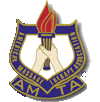
![]()

AMTA
#10445
Clare Caldwell
Massage Therapy
2864 Route 27 Suite C
Lincoln Professional Center
North Brunswick, NJ 08902
732-821-8292
email:
info@massagetherapynj.com
![]()
|
TMJ syndrome is a condition in which the temporomandibular joint does not function properly. This joint connects the temporal bone (the bone that forms the side of the skull) with the mandibular (the jaw bone.) Pain from the dysfunction of the jaw radiates to the face, neck and shoulders. It may also cause difficulty in opening your mouth. The most common causes of TMJ are stress, misaligned bite, grinding of the teeth, poor posture and whiplash. The TMJ self test is to place your little fingers in your ears, then slowly and steadily open and close your jaw. If you at any point hear a clicking, popping or grinding noise, the jaw may be out of alignment. Examination by a professional in diagnosing and treating TMJ is advisable. Tension in the muscles of the jaw can cause headaches, toothaches, dizziness, pressure behind the eyes, pain, ringing in the ears and limited opening and closing of the jaw. Along with physical therapy and TMJ exercise, a trained massage therapist is a great adjunct to relieving stress in the muscles of the jaw. Recommendations:
|
|
| |